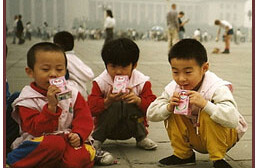Elizabeth A. Cole is a Senior Program Officer at the United States Institute of Peace; the views expressed are her own.
Human rights are a homely business. For most people, they are not the lofty things Chinese students called for from their government in 1989, such as the freedom for individual citizens to express their ideas in public. Among FDR's Four Freedoms, freedom from want and freedom from fear, in the end, may be most important to the majority of people, especially freedom from fear for the safety of their children.
What has changed in China in the 20 years since 1989, and what are Chinese looking for from their government today? In the aftermath of the infamous crackdown, there were fears that China would close itself off from the world again and stop the economic reforms that had begun to bring new opportunities and comforts to millions of Chinese.
But the government, in its own way, heard and responded to some of the demands of the Chinese in that crucial year, when inflation and rising food prices, together with corruption, had caused discontent throughout the country. Economic reforms continued, controls on migration from the country to the cities were loosened, and prosperity began to blossom in China, bringing vast riches to some, a modest middle-class standard of living to millions in cities and rural coastal regions, and small but crucial material benefits to many poor rural Chinese who had long hovered on the brink of subsistence.
The Chinese government succeeded in providing macro-level stability and economic progress in return for the depoliticization of the urban, educated Chinese, but it failed in one crucial area: reducing risk and supplying the protection that only the state can provide, through public health and safety measures such as effective pollution control and enforcement of basic standards of safety in food, medicine, and public infrastructure.
Already in the 1990s, Chinese were discussing the need to beware of fake, shoddy or harmful goods, and these were often the topic for journalists beginning to push the envelope on reporting problems in Chinese society. Rumors abounded of excesses committed by new entrepreneurs emboldened by wild greed, and inferior goods have remained a serious problem in China. For example, in 2001, the Ministry of Agriculture estimated that 20-25 percent of agriculture production goods (such as seeds and fertilizer) were fake or of shoddy quality.1 Health scandals include the sale of fake infant formula in 2004 that lacked any nutritional value, resulting in the death of over a dozen infants and the hospitalization for severe malnutrition of hundreds more. Over the years there have been numerous cases of fake medicines, food and medicine with toxic ingredients, and pesticide-laced food products that have sickened and sometimes killed many both inside and outside China.
But the first great tragedy with wide-spread repercussions was the 1990s spread of AIDS in the impoverished central province of Henan, via tainted plasma given to tens of thousands of poor peasants who had sold their blood for cash. Access to drugs and medical care has ranged from limited to non-existent, and care and advocacy provided by China's nascent non-governmental sector have been limited by governmental attitudes that shift between tolerance and suspicion.
The second tragedy, larger because of its international ramifications, was China's initially evasive reaction to the outbreak of SARS in 2002. Official secrecy, obfuscation and even repression of medical workers attempting to publicize the highly contagious illness contributed to its rapid spread both within China and abroad, which caused deaths, panic, and major financial losses for the Asia-Pacific region.
Paul Thiers has pointed out that "industrialization, technology and global market integration create risks," and that "a government that fails to manage those risks, fails its own people and loses the confidence of the global community." Managing risk requires different administrative approaches and skills from creating the conditions for economic growth and mitigating the effects of a dismantled social welfare system. These include transparency, accountability, and overcoming what Thiers and others call "fragmented authoritarianism," China's inability to enforce national policies at the local level. These capacities were missing in China, for political and practical reasons, but to manage risk in the way that modern citizens, including Chinese, have come to expect as the definition of government legitimacy, China would have to develop them. Writing in 2003, Thiers speculated that post-SARS China was at a crossroads, with SARS offering an opportunity for China to change how it helps its citizens have more security in their daily lives.2
Since the SARS epidemic, there has been, at least at the national level, a true transformation of China's handling of public health emergencies, with greatly improved collaboration with international public health organizations like the WHO and early, vigorous efforts to confront potential threats like the new swine flu. (These efforts may have been vigorous to the point of authoritarianism, as in the sequestering of Mexican citizens.) This attention to preventing the spread of infectious diseases inside China, even if inspired by the fear of international mistrust and censure and resulting damage to China's economy, is an important step forward for the right to health of China's people.
But a succession of other scandals since SARS point to a continued crisis of the state's ability to manage risk, and, significantly, many of these scandals have affected children: the production and sale worldwide of a poisonous syrup that tainted toothpaste and cough medicine (2006 and 2007); melamine-tainted milk products that killed at least six infants and sickened nearly 300,000 others, leaving many with damaged kidneys (2008); and, most spectacularly, the collapse of hundreds of schools during the 2008 earthquake in Sichuan. The Chinese government's recent estimate of children killed (contested by many parents, who believe the numbers are higher) is 5,335, with 546 who survived left disabled.3 The shoddily constructed public school buildings were the product of rampant corruption in the construction sector nationwide, which had been common knowledge for years. Significantly, schools for elite children did not collapse, deepening the sense of abandonment felt by ordinary people whose children were killed. The death of children has particular resonance for Chinese because of the one-child policy, which, although no longer universal, means that in many homes a lost child was the family's one and only child and heir.
Despite official efforts to stop parents of injured or dead children from organizing to demand redress and reform, a number of networks of bereaved Chinese parents have formed, often connected by the internet. Their cause may have deeper social resonance than that of the students of 1989, despite the fact that the students were supported by many at the time and, in a country where fewer made it to higher education than today, were seen as the country's treasure, worthy of public protection. Today's networks have a predecessor in the Tiananmen Mothers group, but they represent a potentially far larger part of the population: any parent who has a child studying in what may be an unsafe school building, or who increasingly fears to give his or her child any one of a range of foods, beverages, or medications.
There is some evidence that the government has attempted to tread more carefully in handling these parents than in their treatment of other aggrieved citizens who have attempted to organize themselves.4 For example, it has created a national compensation plan for parents whose children were harmed by consuming melamine and there have been recent, visible efforts to construct new, safer and higher-quality public school buildings in Sichuan. There have been arrests and trials of people in the melamine case. (Three Sanlu Dairy executives received death sentences and the chairwoman was sentenced to life imprisonment.) Nevertheless, to date nobody has been held accountable for the shoddy construction of the Sichuan schools that collapsed, presumably because the problem was so wide-spread that it would implicate too many local officials. Parents who have tried to demand justice for their children's deaths have been forcibly prevented from doing so (some have been beaten and detained), and were put under intense pressure to take compensation in exchange for signing a document agreeing not to protest.5 In June 2008, the Sichuanese human rights activist Huang Qi was arrested and charged with "illegal possession of state secrets" after he posted an article on his website outlining the demands of five parents whose children died in a school collapse. He still has not been brought to trial.6
It is difficult to argue that the demands of parents who want something as simple as protection for their children are politically inappropriate. This is what sparked the Argentinean human rights movement and resistance against the military junta, personified by the Mothers and Grandmothers of the Plaza de Mayo, who demonstrated daily against a regime that had made their children and grandchildren disappear. Human rights scholar Kathryn Sikkink charts the catalyzing role of these networks of families in global movements for international human rights and transitional justice.7 Similarly, among the human rights groups in Russia most successful at winning popular support were organizations of soldiers' mothers, who campaigned for better conditions for conscripts and against the suffering of these young men, poorly trained, equipped, and led, in the Chechen wars. Political prisoners may be seen by members of the public as subversives or quixotic ideologues who threaten peace and security. Religious prisoners may be dismissed as belonging to cults (Falun Gong) or eccentrics outside the mainstream (underground church members). But it is harder to deny voices arguing that a state claiming to be a modern, world-class leader must provide the conditions to protect their most vulnerable citizens, and be held accountable when that protection fails. "Our children today," they say, "could be yours tomorrow."
The media, along with technological developments have also played, and will continue to play, a role in Chinese citizens' demands for justice of various kinds. Tiananmen was the first political movement to unfold live before a world audience on round-the-clock television, and Chinese organized across the country, including fund-raising in Hong Kong for student leaders via fax, the most advanced technology for social networking in 1989. Today's bereaved parents are organizing via the internet, including providing advice to one another about how to access reparations and health care for melamine-affected babies.
More important, perhaps, is the fact that many Chinese are extremely active participants in chat-rooms and blogs. Despite the use of internet at times to express nationalistic and pro-government viewpoints, China's online "netizens" also voice a range of political opinions on justice and rights, including concern for parents of children who were harmed, demands for government accountability, and disapproval for Chinese nouveau-riche industrialists who discount the needs and concerns of China's workers and environment in their quest for profits.8 Because of the popularity of the internet and the skill of many Chinese in evading government firewalls, it is virtually impossible for the Chinese government to hide evidence of danger and damage to citizens today, or to repress citizen concern and calls for an improved government track record that reach a wide audience.
A crucial question for the next two post-Tiananmen decades is: how will the Chinese government, which bases its authority to restrict political change on its citizens' need for stability, security, and harmony, answer these calls for the protection of the population from avoidable threats? The public faces of unmitigated risk today are all too often those of parents who, having lost their precious only child through state negligence, have very little left to lose.
NOTES
1 "Campaign Against Fake Seeds Bears Fruit," China Daily, February 25, 2001. 2 Paul Thiers, "Risk Society Comes to China: SARS, Transparency and Public Accountability", Asian Perspective, Vol. 27, No. 2, 2003, pp. 241-251. 3 Andrew Jacobs and Edward Wong, "China Reports Student Toll for Quake," The New York Times, May 8, 2009. 4 Ariana Eunjung Cha, "Grieving Parents Gain Clout in China," The Washington Post, March 28, 2009. 5 For example, see Melissa Block, "For Parents, Justice in China School Collapse," NPR, May 27, 2007 6 Editorial, "Huang Qi," The New York Times, February 8, 2009. 7 Kathryn Sikkink, "From Pariah State to Global Protagonist: Argentina and the Struggle for Human Rights" in Latin American Politics and Society, Vol. 50 (1), 2008, June 28, 2008, pp.1-29. 8 Evan Osnos, "Letter from China: Wastepaper Queen," The New Yorker, March 30, 2009, p.46.



